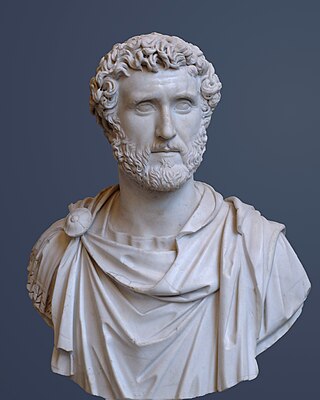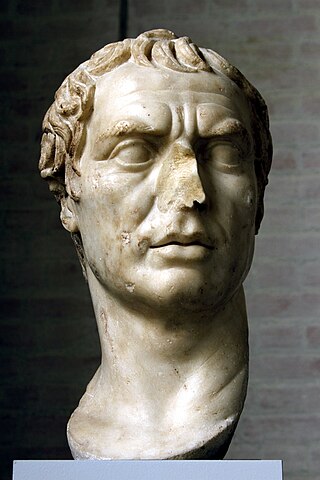Career
| | This section is empty. You can help by adding to it. (June 2023) |
Lucius Cornelius Bocchus was a Lusitanian [1] from Roman Hispania who wrote about natural history. [2] Ancient authors mention his writings, which are otherwise lost. Pliny the Elder provides an excerpt from the chronicle of Cornelius Bocchus and mentions him as one of his sources. [3]
| | This section is empty. You can help by adding to it. (June 2023) |

Titus Aelius Hadrianus Antoninus Pius was Roman emperor from AD 138 to 161. He was the fourth of the Five Good Emperors from the Nerva–Antonine dynasty.

Lusitania was an ancient Iberian Roman province encompassing most of modern-day Portugal and a large portion of western Spain. Romans named the region after the Lusitanians, an Indo-European tribe inhabiting the lands.

Marcus Aurelius Antoninus was Roman emperor from 161 to 180 and a Stoic philosopher. He was a member of the Nerva–Antonine dynasty, the last of the rulers later known as the Five Good Emperors and the last emperor of the Pax Romana, an age of relative peace, calm, and stability for the Roman Empire lasting from 27 BC to 180 AD. He served as Roman consul in 140, 145, and 161.
Year 105 BC was a year of the pre-Julian Roman calendar. At the time it was known as the Year of the Consulship of Rufus and Maximus and the Sixth Year of Yuanfeng. The denomination 105 BC for this year has been used since the early medieval period, when the Anno Domini calendar era became the prevalent method in Europe for naming years.

Gaius Marius was a Roman general and statesman. Victor of the Cimbric and Jugurthine wars, he held the office of consul an unprecedented seven times.

Lucius Cornelius Sulla Felix, commonly known as Sulla, was a Roman general and statesman. He won the first big civil war in Roman history and became the first man of the Republic to seize power through force.

The Jugurthine War was an armed conflict between the Roman Republic and King Jugurtha of Numidia, a kingdom on the north African coast approximating to modern Algeria. Jugurtha was the nephew and adopted son of Micipsa, king of Numidia, whom he succeeded on the throne, he had done so by overcoming his rivals through assassination, war, and bribery.
Titus Pomponius Atticus was a Roman editor, banker, and patron of letters, best known for his correspondence and close friendship with prominent Roman statesman Marcus Tullius Cicero. Atticus was from a wealthy Roman family of the equestrian class and from the Pomponia gens.
Faustus Cornelius Sulla was a politician of the Roman Republic. He was the son of the dictator Lucius Cornelius Sulla. He started his career in the shadow of Pompey, whom he followed during the Civil War against Julius Caesar. He was killed soon after the battle of Thapsus in 46 BC.

The gens Cornelia was one of the greatest patrician houses at ancient Rome. For more than seven hundred years, from the early decades of the Republic to the third century AD, the Cornelii produced more eminent statesmen and generals than any other gens. At least seventy-five consuls under the Republic were members of this family, beginning with Servius Cornelius Maluginensis in 485 BC. Together with the Aemilii, Claudii, Fabii, Manlii, and Valerii, the Cornelii were almost certainly numbered among the gentes maiores, the most important and powerful families of Rome, who for centuries dominated the Republican magistracies. All of the major branches of the Cornelian gens were patrician, but there were also plebeian Cornelii, at least some of whom were descended from freedmen.
Gaius Avidius Nigrinus was a Roman senator who lived between the 1st and 2nd centuries. Nigrinus served as suffect consul for the nundinium of April to June 110 with Tiberius Julius Aquila Polemaeanus as his colleague.

The gens Annia was a plebeian family at ancient Rome. Livy mentions a Lucius Annius, praetor of the Roman colony of Setia, in 340 BC, and other Annii are mentioned at Rome during this period. Members of this gens held various positions of authority from the time of the Second Punic War, and Titus Annius Luscus attained the consulship in 153 BC. In the second century AD, the Annii gained the Empire itself; Marcus Aurelius was descended from this family.

Publius Cornelius Scipio Africanus was a Roman general and statesman, most notable as one of the main architects of Rome's victory against Carthage in the Second Punic War. Often regarded as one of the greatest military commanders and strategists of all time, his greatest military achievement was the defeat of Hannibal at the Battle of Zama in 202 BC. This victory in Africa earned him the honorific epithet Africanus, literally meaning "the African", but meant to be understood as a conqueror of Africa.
Publius Sittius was a Roman equites and mercenary commander. As a mercenary he was employed by king Bocchus II of East-Mauretania. Sittius fought for Bocchus against king Juba I of Numidia, capturing Juba's capital of Cirta and defeating the Numidian army under general Saburra. He also supported Julius Caesar in the civil war between Caesar and the Optimates, ultimately catching and killing Faustus Cornelius Sulla and Lucius Afranius and destroying Scipio's fleet off Hippo Regius. He was a personal friend of Marcus Tullius Cicero.
LuciusFulcinius Trio was a Roman senator who came from a plebeian family. Trio was an active prosecutor (delator) during the reign of Tiberius who developed a reputation for making accusations. He was governor of Lusitania from about 21 to 31, before returning to Rome to hold the office of consul suffect with Publius Memmius Regulus in 31. His friendship with Sejanus would lead to allegations that ended with his suicide in early 35.
Punicus was a chieftain of the Lusitanians, a proto-Celtic tribe from western Hispania. He became their first military leader during the Lusitanian War, and also led their first major victories against Rome.
Caesarus was a chieftain of the Lusitanians, a proto-Celtic tribe from western Hispania. He followed and later replaced Punicus as their major military leader during the Lusitanian War.
The Second Battle of Cirta, part of the Jugurthine War, was fought in 106 BC between a Numidian-Mauretanian coalition and a Roman army near the Numidian capital of Cirta. The Numidians were led by King Jugurtha, the Mauritanians were led by king Bocchus while the Romans were under the overall command of Gaius Marius who was supported by his quaestor Lucius Cornelius Sulla as cavalry commander. The Romans were victorious routing their opponents and capturing Cirta.
The Battle of Hippo Regius was a naval encounter during Caesar's Civil War which occurred off the coast of the African city of Hippo Regius in 46 BC. Metellus Scipio and a number of influential senators from the Optimate faction were fleeing the disastrous Battle of Thapsus when their fleet was intercepted and destroyed by Publius Sittius, a mercenary commander in the employ of the Mauretanian king Bogud, an ally of Gaius Julius Caesar's. Scipio committed suicide and all of the other senators were killed during the battle.